Doctors Say These 8 Foods Might Be Making Your Anxiety and Depression Worse

Sleeping well, exercising, meditating, and journaling: These are all things your doctor or therapist might recommend trying if you’re struggling with anxiety or depression. You may not always be able to alleviate those feelings of fear, dread, or agitation through lifestyle interventions—sometimes pharmaceuticals are, in fact, the best medicine. However, your daily habits certainly lay the groundwork for sustaining any improvements you make in your mental health.
Changing your diet is one particularly powerful way to reclaim your feeling of calm—and experts say that avoiding certain foods can be especially impactful. “The tricky thing is, what kinds of food do you think we reach for when we’re anxious or depressed? Usually, comfort foods or ones that will give us a short-term ‘hit’ of dopamine,” says naturopathic doctor Katherine Maslen, ND.
As such, following a nutrient-dense diet that’s rich in plant-based foods and lean sources of protein can help you stabilize your mood. It can also help you maintain balanced blood sugar levels—a key strategy in avoiding anxiety spikes. Ahead, doctors and dietitians share the foods to avoid if you’re dealing with anxiety.
RELATED: 12 Best Foods to Ease Anxiety, Experts Say.
First, understand the gut-brain connection.

“It’s not rocket science that healthy eating is associated with good health, but we rarely discuss the importance of healthy eating for the developing brain, arguably the most important organ in the body,” says psychiatrist Uma Naidoo, MD, who founded the first nutritional psychiatry service in the U.S. at Massachusetts General Hospital in Boston, and is the author of the book This is Your Brain on Food.
“The foods we consume have a big influence on our mental health and cognitive function, due to the connection between our gut and our brain,” she explains. “These organs have been intimately related even before we were born; they develop from the same exact cells in the embryo.”
“Linked via the vagus nerve, which connects nerve endings in our gut to nerves in the brain, our digestive track and mind quite literally speak to each other,” Naidoo continues. “More than 90 percent of the receptors for the neurotransmitter serotonin, which is responsible for mood and cognition, are located in the gut, highlighting just how powerful this food-mood connection is.”
Maslen further explains how lack of protein can worsen anxiety and depression.
“Protein is necessary to produce serotonin, GABA, and other neurotransmitters. When protein intake is low, our production slows,” she shares. “So, while a common treatment for anxiety and depression is SSRIs or SNRIs, which aim to keep more serotonin at the nerve synapse, often people don’t have what it takes to produce enough serotonin in the first place. This is something we need to address.”
2
Added sugar
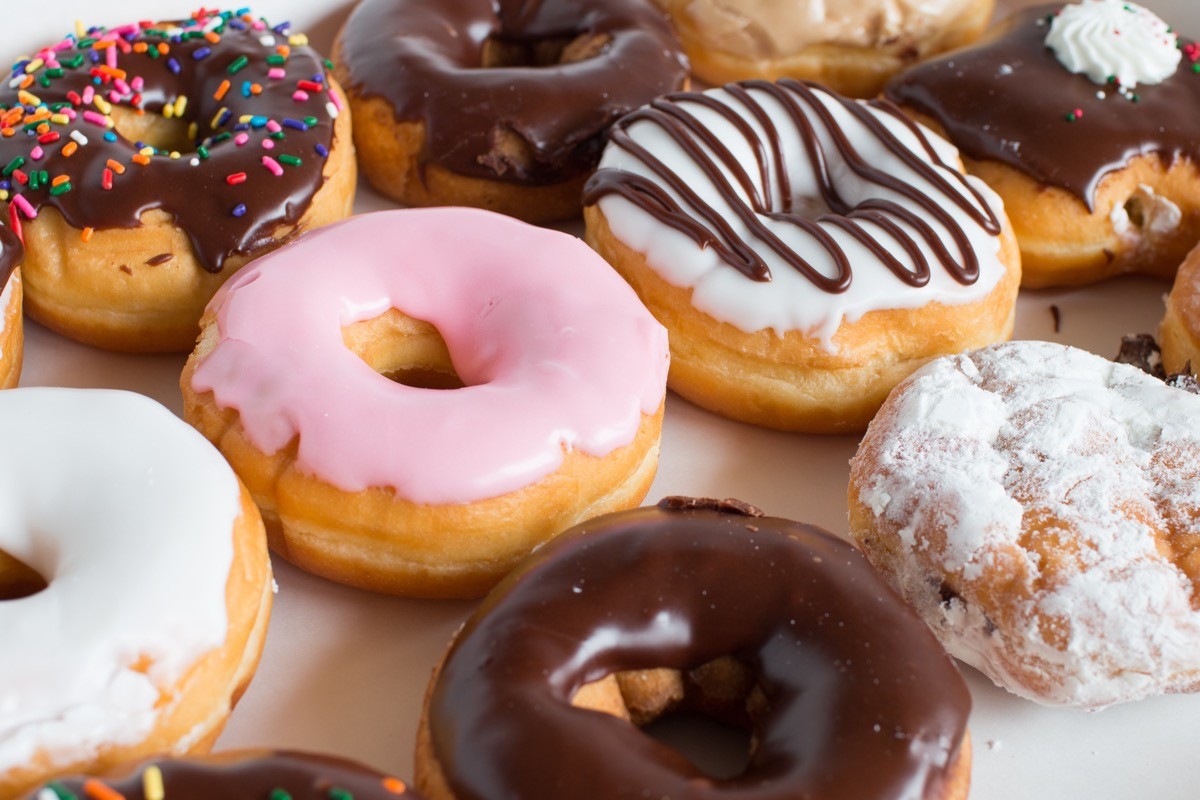
Excess sugar is one of the most common and well-studied dietary causes of increased anxiety.
“Sugar overconsumption leads to changes in neurobiological brain function which alter emotional states and subsequent behaviors,” explains a 2019 study published in the journal Neuroscience and Behavioral Reviews. “Addiction, stress, fear, anxiety and depression involve overlapping neural mechanisms.”
One analysis of studies involving more than 37,000 depression cases in the Journal of Affective Disorders found that when compared to people who didn’t drink soda, those who drank the equivalent of three cans of cola daily could have a 25 percent higher risk of developing depression.
That’s why it’s important to avoid any food that “raises and then drops your blood sugar,” Daniel Amen, MD, a psychiatrist, author, and mental health content creator, said in a TikTok post. He suggests cutting back on sneaky sources of sugar, such as bread, pasta, potatoes, rice, fruit juice, and more.
Angel Luk, RD, a registered dietitian and the co-founder of FoodMysteries.com, adds that it’s important to read labels and be especially vigilant against added sugars or those that do not occur naturally.
“The World Health Organization (WHO) has recommended that children and adults keep added sugar intake to less than 6 teaspoons (or 24 grams) per day. That’s not a big budget, considering one 355mL can of Coca-Cola contains 10 teaspoons (39 grams) of added sugar,” she tells Best Life.
3
Ultra-processed foods
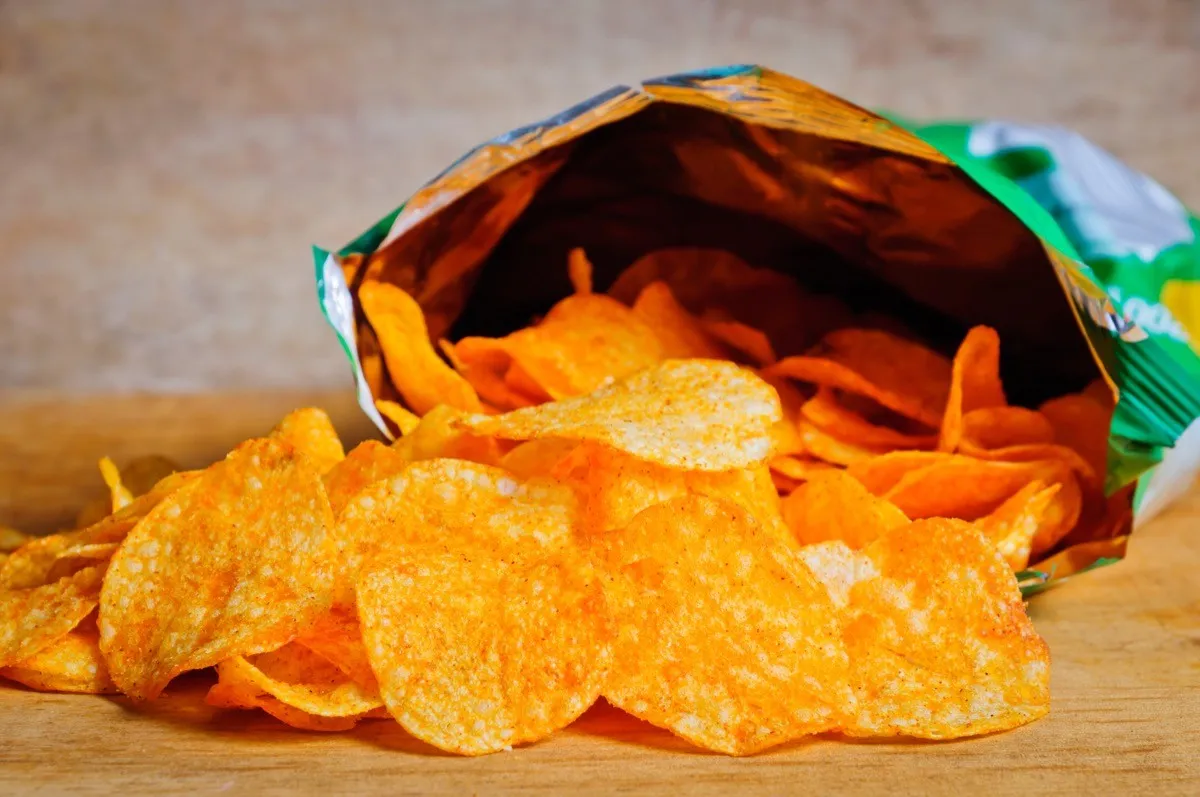
There are plenty of reasons to avoid processed foods: They’ve been linked to higher rates of obesity, heart disease, hypertension, diabetes, and even cancer. Now, experts are tracking the connection between highly processed foods and mood disorders such as anxiety and depression.
“A recent study published in Nutrients revealed that greater ultra-processed food consumption is associated with increased odds of anxiety and depressive symptoms, although the causal pathways are not yet known,” says Luk.
“While there are no specific guidelines (unlike added sugar and caffeine) for processed food intake levels that are safe, worldwide government and public health agencies agree that for the purposes of improving physical and mental health, limiting processed (and especially ultra-processed) foods is the correct course of action,” she adds.
4
Processed meats

More specifically, processed and cured meats should be avoided since they are “often high in nitrates and chemical additives that create inflammation in both our body and brain,” says Naidoo. “And inflammation in the brain is a common culprit of poor mental health symptoms like anxiety.”
In one experiment, Johns Hopkins Medicine researchers put rats on a diet with added nitrates and found that the rodents showed mania-like hyperactivity after just a few weeks. Other studies suggest a possible connection between nitrates and mania in humans.
While it doesn’t suggest cause and effect, a study by those same Johns Hopkins scientists noted that people hospitalized for an episode of mania had more than three times the odds of having eating nitrate-cured meats than people without a history of serious psychiatric disorder.
5
Food dyes and artificial sweeteners
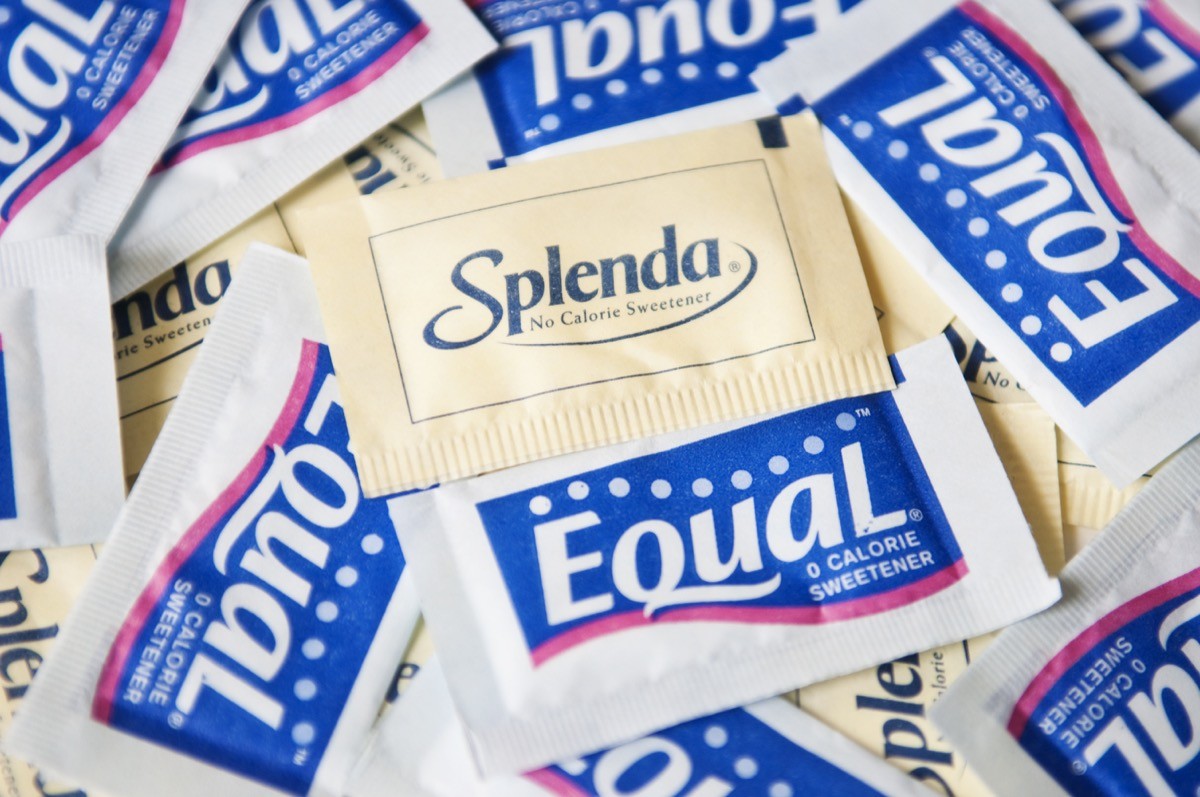
Often found within processed foods—but sometimes hidden in packaged products billed as “healthy”—food dyes and artificial sweeteners can also spike your anxiety, says Gina Nick, ND, a naturopathic physician and the founder and director for HealthBridge Newport Beach, CA.
“These additives can cause neuro-excitability, leading to symptoms such as hyperactivity, irritability, and anxiety,” she explains. “The neurotoxic effects of these chemicals are particularly concerning in developing brains, making them a significant risk factor for children and adolescents.”
6
Refined grains
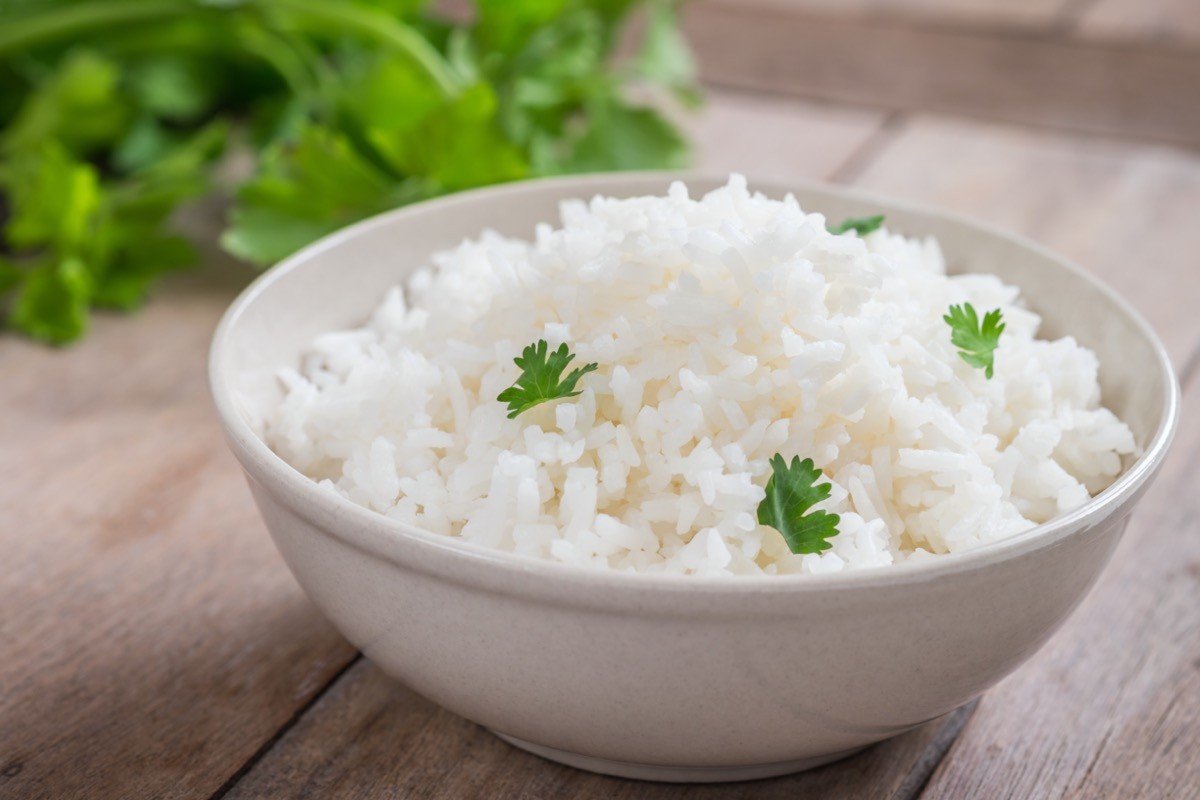
“I encourage patients to limit foods with a high glycemic index, such as white bread and white rice,” says Naidoo. Refined grains like these have had their fiber and much of their nutrition removed.
“These foods promote inflammation and negatively affect the health of the gut microbiome, which hampers effective communication between the gut and brain. And mental health suffers,” she explains.
By contrast, eating fiber-rich whole grains improves blood sugar control and can help prevent Type 2 diabetes.
According to the Centers for Disease Control and Prevention, people with diabetes are two to three times more likely to suffer from depression than people without diabetes. And research suggests that whole grains like oats, brown rice, 100-percent whole wheat, and bulgur, may help balance levels of feel-good, mood stabilizing neurotransmitters, such as tyrosine and serotonin.
7
Caffeine

Caffeine, especially when consumed in excess, can also contribute to anxious or depressive feelings.
“One study published in General Hospital Psychiatry highlights that caffeine intake equal to about five cups of coffee increases anxiety among healthy adults and induces panic attacks in patients with panic disorder,” says Luk.
However, most people would benefit from keeping their levels even lower. “Further studies are needed to understand the exact relationship at play, but it would be prudent for all adults to keep caffeine intake below 400 mg (300mg if pregnant or breastfeeding),” Luk adds.
Maslen says your reaction to caffeine may also vary depending on the source: “Matcha or green tea also has caffeine, but good quality sources will also contain L-Theanine, which is excellent for calming anxiety. Swapping out your coffee for a matcha may help to give you the energy boost without as much anxiety.”
8
Alcohol

Alcohol is among the most direct triggers for feelings of anxiety and depression.
“Alcohol is an issue because it depletes pretty much every single nutrient that you need to make neurotransmitters. Magnesium, zinc, and B6 are all essential to produce GABA and serotonin, and regular alcohol intake, even only a couple of units, is enough to throw things off balance,” explains Maslen.
“The WHO cautions people living with anxiety to avoid or cut down on alcohol, which can make anxiety symptoms worse,” says Luk.
“Of note, the Canadian Centre on Substance Use and Addiction (CCSA) states that ‘for your health, less alcohol is better,’ including the more specific guideline that zero drinks per week has benefits including better health and sleep. However, it also says that ‘you are likely to avoid alcohol-related consequences for yourself or others’ at a consumption level of two standard drinks or less per week.”
9
Fast food
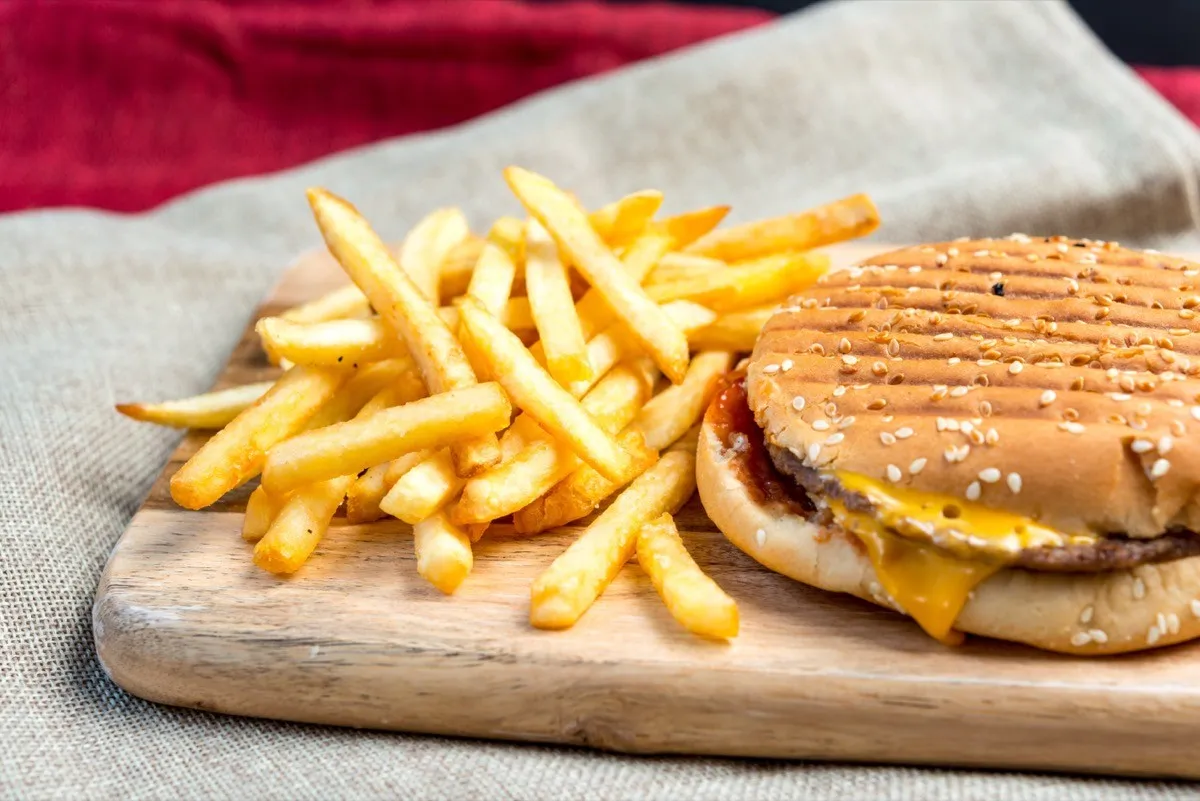
Enjoying a hamburger and french fries once in a while is unlikely to sink you into clinical depression, but making a habit of eating fast food may.
Fried foods and fast-food meals are often high in salt, saturated fats, refined sugars, and even trans fats, which can worsen anxiety and depression.
One study, published in the journal Public Health Nutrition, revealed that people who regularly eat fast foods like hamburgers, sausage, and pizza, are 51 percent more likely to develop depression than people who rarely or never eat fast food.
“A daily diet of fast foods basically makes the bad gut bacterial thrive, and that triggers inflammation,” explains Naidoo. “Targeting this inflammation through nutrition is becoming a means of improving symptoms of depression and anxiety, as well as preventing neurodegenerative diseases (like dementia and Alzheimer’s disease) and provides tangible ways for individuals to take power over their mental health.”
What’s one of the best ways to turn the tide against inflammation and support gut and brain health? Follow a Mediterranean-style diet rich in vegetables, fruits, olive oil, fish, and whole grains, which has been linked to lowering risk of developing depression, suggest Naidoo.